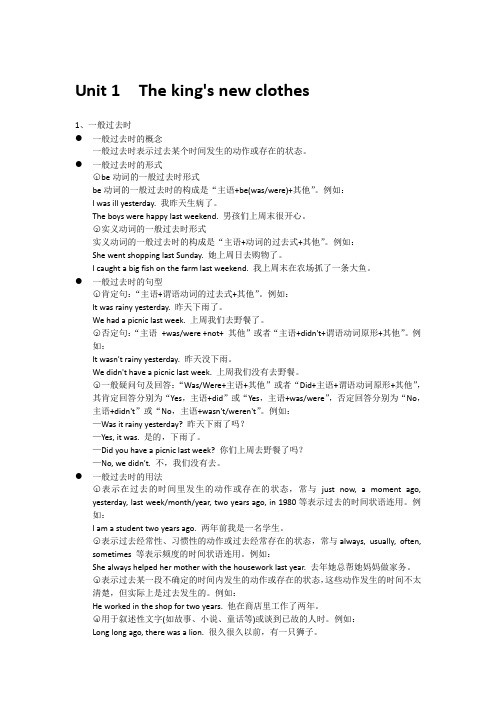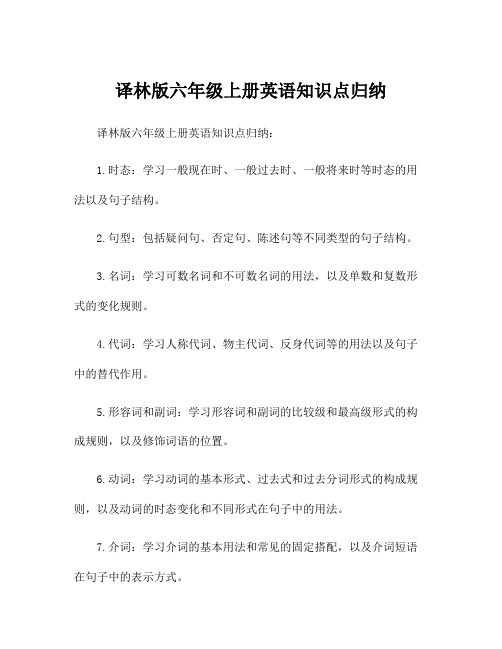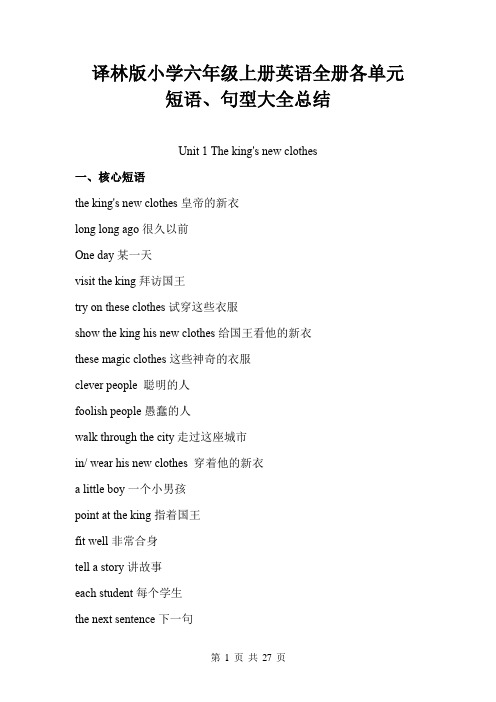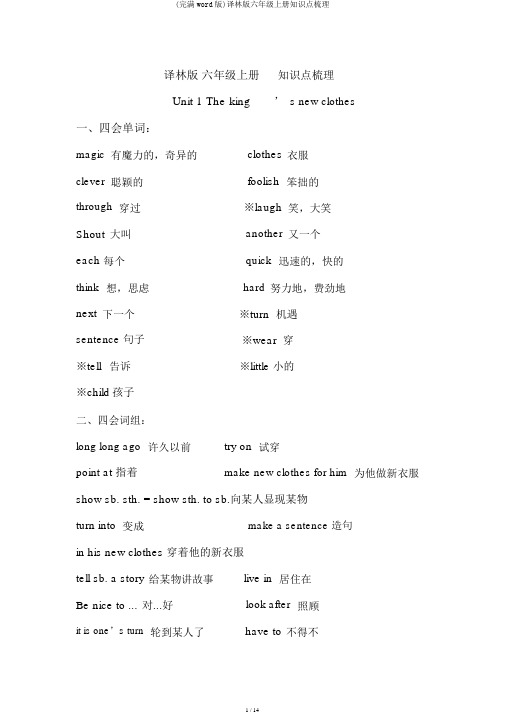译林版小学英语六年级上册知识点(全)
六上英语译林版知识点汇总

六上英语译林版知识点汇总
一、词汇
1. 四会单词:学生需要掌握四会单词,即会听、说、读、写。
这些单词包括常用的名词、动词、形容词、副词等。
2. 习惯用语:学生需要掌握一些常见的习惯用语,如问候、道别、感谢、道歉等常用表达方式。
二、语法
1. 现在进行时:学生需要掌握现在进行时的构成和用法,如“I am doing my homework now.”等。
2. 一般现在时:学生需要掌握一般现在时的构成和用法,如“I usually get up at 7 o’clock every day.”等。
3. 一般过去时:学生需要掌握一般过去时的构成和用法,如“She went to the park last weekend.”等。
三、语音
学生需要掌握元音字母及常见字母组合的发音,如“ea”、“ai”、“ay”等。
此外,还需要了解重音和语调的规则。
四、句型
学生需要掌握陈述句、疑问句和祈使句的构成和用法,如“I have a new friend.”、“Do you like apples?”和“Please sit down.”等。
五、情景交际
学生需要在不同的情境中运用所学句型进行交流,如购物、问
路、打电话等。
此外,还需要了解不同国家的文化和习惯用语。
新译林版六年级上册英语知识点归纳总结

Unit 1 The king's new clothes1、一般过去时●一般过去时的概念一般过去时表示过去某个时间发生的动作或存在的状态。
●一般过去时的形式○1be动词的一般过去时形式be动词的一般过去时的构成是“主语+be(was/were)+其他”。
例如:I was ill yesterday. 我昨天生病了。
The boys were happy last weekend. 男孩们上周末很开心。
○2实义动词的一般过去时形式实义动词的一般过去时的构成是“主语+动词的过去式+其他”。
例如:She went shopping last Sunday. 她上周日去购物了。
I caught a big fish on the farm last weekend. 我上周末在农场抓了一条大鱼。
●一般过去时的句型○1肯定句:“主语+谓语动词的过去式+其他”。
例如:It was rainy yesterday. 昨天下雨了。
We had a picnic last week. 上周我们去野餐了。
○2否定句:“主语+was/were +not+ 其他”或者“主语+didn't+谓语动词原形+其他”。
例如:It wasn't rainy yesterday. 昨天没下雨。
We didn't have a picnic last week. 上周我们没有去野餐。
○3一般疑问句及回答:“Was/Were+主语+其他”或者“Did+主语+谓语动词原形+其他”,其肯定回答分别为“Yes,主语+did”或“Yes,主语+was/were”,否定回答分别为“No,主语+didn't”或“No,主语+wasn't/weren't”。
例如:—Was it rainy yesterday? 昨天下雨了吗?—Yes, it was. 是的,下雨了。
—Did you have a picnic last week? 你们上周去野餐了吗?—No, we didn't. 不,我们没有去。
六年级译林版英语上册

六年级译林版英语上册一、单词部分。
1. 重点单词汇总。
- Unit 1 The king's new clothes.- clothes:衣服,是复数形式,没有单数形式的表达,例如:These clothes are beautiful.(这些衣服很漂亮。
)- king:国王,例如:The king is very rich.(这个国王非常富有。
)- foolish:愚蠢的,例如:Don't be so foolish.(不要如此愚蠢。
)- point at:指着,例如:Don't point at others.(不要指着别人。
)- Unit 2 What a day!- cloudy:多云的,是形容词,用来描述天气,例如:It's cloudy today.(今天多云。
)- rainy:下雨的,例如:We can't go out on a rainy day.(下雨天我们不能出去。
)- sunny:晴朗的,例如:It was sunny yesterday.(昨天天气晴朗。
)- windy:有风的,例如:It's windy in spring.(春天多风。
)- Unit 3 Holiday fun.- holiday:假期,例如:I had a great holiday.(我度过了一个很棒的假期。
)- fun:乐趣,例如:We had a lot of fun at the party.(我们在聚会上玩得很开心。
)- visited(visit的过去式):参观,拜访,例如:I visited my grandparents last week.(我上周拜访了我的祖父母。
)- Unit 4 Then and now.- ago:以前,例如:I lived in a small village five years ago.(五年前我住在一个小村庄。
译林版六年级上册英语知识点归纳

译林版六年级上册英语知识点归纳译林版六年级上册英语知识点归纳:1.时态:学习一般现在时、一般过去时、一般将来时等时态的用法以及句子结构。
2.句型:包括疑问句、否定句、陈述句等不同类型的句子结构。
3.名词:学习可数名词和不可数名词的用法,以及单数和复数形式的变化规则。
4.代词:学习人称代词、物主代词、反身代词等的用法以及句子中的替代作用。
5.形容词和副词:学习形容词和副词的比较级和最高级形式的构成规则,以及修饰词语的位置。
6.动词:学习动词的基本形式、过去式和过去分词形式的构成规则,以及动词的时态变化和不同形式在句子中的用法。
7.介词:学习介词的基本用法和常见的固定搭配,以及介词短语在句子中的表示方式。
8.冠词:学习"a"、"an"和"the"的用法和区别,以及冠词与其他词类的搭配。
9.数词:学习基数词、序数词和分数的表达方式及用法。
10.并列连词:学习并列连词的用法和表示方式,如"and"、"but"、"or"等。
11.程度副词:学习表示程度或强调的副词,如"very"、"too"、"so"等。
12.物体和物品:学习常见的物体和物品的名称,以及它们的形状、颜色、尺寸等特征描述。
13.动物、植物和自然界:学习不同种类的动物、植物和自然界的名称及特征描述。
14.基本日常生活用语:学习常见的日常用语,如问候、道谢、表达喜欢和不喜欢等。
15.时间、日期和季节:学习表示时间、日期和季节的词汇与句型。
16.地点和方位:学习表示地点和方位的词汇,如家、学校、街道、方向等。
17.格言和谚语:学习一些常见的格言和谚语,了解其中的含义和用法。
18.文化习俗和节日传统:学习不同国家或民族的文化习俗和节日传统,了解和欣赏多元文化。
以上是译林版六年级上册英语的知识点归纳,希望可以准确回答您的问题。
译林版小学六年级上册英语全册各单元短语句型大全总结

译林版小学六年级上册英语全册各单元短语、句型大全总结Unit 1 The king's new clothes一、核心短语the king's new clothes皇帝的新衣long long ago很久以前One day某一天visit the king拜访国王try on these clothes试穿这些衣服show the king his new clothes给国王看他的新衣these magic clothes这些神奇的衣服clever people 聪明的人foolish people愚蠢的人walk through the city走过这座城市in/ wear his new clothes 穿着他的新衣a little boy一个小男孩point at the king指着国王fit well非常合身tell a story讲故事each student每个学生the next sentence下一句think hard努力地想have to不得不in front of the house在房子前面;walk by the house步行经过房子shout at the old man对着老人大喊give me your child 把你的孩子给我be nice to her对她很好look after him照顾他turn into a prince变成王子二、重点句型1. My king, we can make new clothes for you.我的国王,我们可以给您做新衣服。
【解析】can为情态动词,后面跟动词原形;“make sth.for sb."意为“为某人制作某物",for为介词,后面如果跟人称代词需要用其宾格形式。
My mother can make dresses for me.我妈妈可以给我做连衣裙。
They are making a birthday cake for Su Hai.他们正在为苏海制作一个生日蛋糕。
六年级英语上册译林

六年级英语上册译林一、重点单词。
1. 月份类。
- January(一月),February(二月),March(三月),April(四月),May (五月),June(六月),July(七月),August(八月),September(九月),October(十月),November(十一月),December(十二月)。
- 记忆方法:可以按照顺序编成口诀,如“January February,新年刚过忙三月(March)”等,也可以通过制作单词卡片,一面写单词,一面写中文释义和简单的月份特点(如January有新年等)来记忆。
2. 节日类。
- New Year's Day(元旦),Chinese New Year(春节),Mid - Autumn Festival(中秋节),Dragon Boat Festival(端午节)等。
- 对于节日类单词,可以结合节日的文化习俗来记忆。
例如,对于Dragon Boat Festival,可以联想龙舟比赛、吃粽子等习俗,这样能更好地记住单词。
3. 日常活动类。
- have breakfast(吃早饭),have lunch(吃午饭),have dinner(吃晚饭),go to school(去上学),go to bed(去睡觉),get up(起床)等。
- 可以通过模拟日常场景对话来练习这些单词的使用。
比如和同学互相问答:“What time do you get up?”“I get up at six o'clock.”二、重点句型。
1. 询问日期。
- What date is it today? It is + 日期(如the first of June)。
- 在练习这个句型时,可以制作一个简单的日历,每天互相询问日期,加深印象。
2. 询问节日。
- What festival is in + 月份?- 例如:What festival is in January? There is New Year's Day in January.3. 日常活动时间安排。
(完整word版)译林版六年级上册知识点梳理

译林版六年级上册知识点梳理Unit 1 The king’ s new clothes一、四会单词:magic有魔力的,奇异的clothes衣服clever聪颖的foolish笨拙的through穿过※laugh笑,大笑Shout大叫another又一个each每个quick迅速的,快的think想,思虑hard努力地,费劲地next下一个※turn机遇sentence 句子※wear穿※tell告诉※little 小的※child孩子二、四会词组:long long ago许久以前try on试穿point at 指着make new clothes for him为他做新衣服show sb. sth. = show sth. to sb.向某人显现某物turn into变成make a sentence 造句in his new clothes 穿着他的新衣服tell sb. a story给某物讲故事live in居住在Be nice to ...对...好look after照顾it is one’s turn轮到某人了have to不得不in front of在...前面walk by经过think hard努力地思虑shout at sb. 对某人大叫三.重点句型:1.Long long ago, there was a king. 许久许久以前,有一个国王。
2.Two men visited the king. 两个男人来拜会国王。
3.We can make new clothes for you. 我们能够为你做新衣服。
4.The two men showed the king his new clothes. 这两个人向国王显现了他的新衣服。
5.The king walked through the city in his new clothes. 国王穿着他的新衣服步行穿过城市。
(完整word版)苏教版译林版英语六年级上册复习知识点汇总

苏教版译林版英语六年级上册知识点汇总Unit 1 The king’s new clothes一,单词/词组1. long long ago 很久以前2. new clothes 新衣服3. make new clothes for you 为你制作新衣服make sth for sb4. show the king his new clothes给皇帝展示新衣服show sb. sth.= show sth. to sb.5.try on 试穿try on the coat=try the coat on try it/them6. magic clothes 有魔力的衣服7. walk through步行穿过8. in his new clothes 穿着他的新衣服9. shout at sb. 对某人大叫10. laugh at sb. 对某人大笑11. look at 看….12. point at 指向…13. fit well 非常适合14. an American cowboy 一个美国牛仔15. a Scottish man 一位苏格兰人16. tell a story 讲一个故事17. say a/one sentence 说一句话18. on the mountain 在山上19. the next sentence 下一句话20. live in the house 住在房子里21. tell the boy a story 给这个男孩讲一个故事tell sb. sth.22. it is one’s turn 某人的机会23. think hard 努力思考24. have to 不得不have to do sth.25. in front of 在….前面(外部)in the front of 在… 前面(内部)26. walk by 路过27. be nice to sb. 对某人好28. look after 照顾29. turn into 变成二,句型1. Long long ago, there was a king. 很久很久以前,有一位国王。
- 1、下载文档前请自行甄别文档内容的完整性,平台不提供额外的编辑、内容补充、找答案等附加服务。
- 2、"仅部分预览"的文档,不可在线预览部分如存在完整性等问题,可反馈申请退款(可完整预览的文档不适用该条件!)。
- 3、如文档侵犯您的权益,请联系客服反馈,我们会尽快为您处理(人工客服工作时间:9:00-18:30)。
Unit 1 The King’s new clothes 一、词汇1.有魔力的magic2.聪明的clever3.想think4.愚蠢的foolish5.穿过through6.笑,大笑laugh7.穿wear8.讲,叙述tell9.每个each10.说say11.句子sentence12.迅速的,快的quick13.下一个next14.小的little15.机会turn16.努力地,费劲地hard17.孩子child (复数children)二、短语1.皇帝的新衣the king’s new clothes2. 某一天one day3. 拜访国王visit the king4.两个男子/女子two men/women5.穿过城市walk through the city6. 试穿try on7.这些魔法these magic clothes8.为你做新衣服make new clothes for you9. 在街上in the street10.给国王看他的新衣show the king his new clothes11.聪明的人clever people12.愚蠢的人foolish people13.看着国王look at the king14.穿着他的新衣in his new clothes / wear his new clothes15.一个小男孩a little boy16.指着国王point at/to the king17.非常合身fit well18. 今天下午this afternoon19. 一张来自我好友Mark的卡a card from my good friend Mark20. 来参加我的聚会come to my party21.在四点半at half past four22.在公园里in the park23.一个美国牛仔an American cowboy 24.穿着牛仔裤wear jeans25.一个苏格兰男士a Scottish man26. 穿一条苏格兰裙wear a kilt27. 讲故事tell a story28. 狐狸老师和她的学生们Miss Fox and her students29. 在山上on the mountain30.下一句the next sentence31.给男孩讲了一个故事tell the boy a story32.努力地想think hard33.不得不重新开始讲故事have to start the story again34.住在森林里live in the forest35. 生病了be sick/be ill36.在狮子的房子前面in front of the lion’s house37.在房子旁边散步walk by the house38.照顾他look after him39.愤怒的狮子the angry lion40.对着老人大喊shout at the old man41.把你的孩子给我give me your child =give your child to me42. 背诵课文recite the text43.和狮子住在一起live with the lion44.对她很好be nice to her45.变成一个王子turn into a prince三、句子1.很久以前,有个国王。
Long long ago, there was a king.2.那两个男人向国王展示了他的新衣服。
The two men showed the king his new clothes.3.国王穿着他的新衣服走过城市。
The king walked through the city in his new clothes.4.多么漂亮的衣服啊!What beautiful clothes! =How beautiful the clothes are!5.一个小男孩指着国王大笑,“哈哈!这国王没有穿任何衣服!”A little boy pointed at the king and laughed, ”Ha! Ha! The king isn’t wearing any clothes!”6.两个男人想要为国王做新衣服。
Two men wanted to make new clothes for the king.7.今天下午我从我的好朋友马克那里得到一张卡片。
This afternoon, I got a card from my good friend Mark. 8.四点半在公园来参加我的派对。
Come to my party at half past four in the park.9.每个学生说一个句子。
Each student says one sentence.10.在山上有座房子。
There was a house on the mountain.11.下一句是什么?What’s next? (What’s the next sentence?)12.狮子变成了一位王子。
The lion turned into a prince.13.女孩照顾了他。
The girl looked after him.14.狮子对她很好。
The lion was nice to her.15.你摘了一朵花。
You picked a flower.16.轮到Bobby了。
It is Bobby’s turn.Unit 2 What a day 一、单词1. sunny 晴朗的2. show 展览,展示3.interesting 有趣的4.weather 天气5.become 变成,变为6.windy 有风的7.cloudy 多云的8.high 在高处9.honey 蜂蜜10.drink 饮料11.ant 蚂蚁12.bee 蜜蜂13. cloud 云14.rain 下雨15.meet 遇见16. lose 丢失17.know 知道18.dumpling饺子19.rainy下雨的20.cloudy多云的21.wet湿的22.cheer欢呼23.lose丢失二、词组1.do the housework做家务2.climb up 爬上3.hold onto 抓紧4.fly away 飞走5.by bike骑自行车6.a parrot show 鹦鹉展7.in the sky 在天空中8.fly kites放风筝9.black clouds乌云10. all day整天11.go away走开12.well done干得好13.look sad开起来悲伤14.near the hill在小山附近15.have a picnic野餐16.watch a film看电影17.go swimming去游泳三、过去式(不规则)1.become—became变成[bɪ'keɪm]2.bring—brought带来[brɔːt]3.fly—flew 飞[fluː]4.go—went 去[went]5.see—saw 看见[sɔː]6.take—took拿,带[tʊk]7.eat—ate 吃[et; eit]8.do,does—did 做(行为动词),无意义(助动词)[dɪd]9.lose—lost 丢失[lɒst]10.find—found找到[faʊnd]11.have,has—had有[hæd]12. can --- could 能[ kʊd]13. get --- got得到[ɡɒt]14. make --- made 制作[meɪd]15. come --- came 来[keɪm]16. am, is --- was 是[wɒz]17. are --- were 是/wə, wɜː/18. tell --- told 告诉[təʊld]19. give --- gave 给[ɡeɪv]20. say --- said 说[sed]四、句子1.It was sunny and cloudy in the morning.早晨晴朗多云。
2.The weather became windy.天气变得有风了。
3.It rained in the afternoon.下午下雨了。
4.We saw many interesting parrots.我们看见许多有趣的鹦鹉。
5.We brought some dumplings, some bread and honey and some drinks.我们带了一些饺子、面包和蜂蜜,还带了些饮料。
6.What happened?出什么事了?7. What a day! 多么糟糕的一天!8. Sam wants to know why. 山姆想知道为什么。
(=Sam wants to know why he lost his new kite.)9. The kite flew high, but it flew too high and we couldn’t hold onto it.那风筝飞得很高,但太高了,我们抓不住它。
五、规则动词过去式变化规律1. 大多数动词后面直接加--ed,如:help --- helped, shout --- shouted, rain --- rained, play --- played;2. 结尾有不发音的e, 直接加--d,如:like --- liked, dance --- danced;3. 结尾是辅音字母加y结尾的,改y为i, 在加--ed,如:study --- studied, carry --- carried;4. 结尾时重读闭音节,而且末尾只有一个辅音时,双写这个辅音,再加--ed,如:stop --- stopped, chat --- chatted六、规则动词加ed之后的发音1. 清辅音(/p/、/ k/、/f/、/θ/、/s/、/ʃ/、/tʃ/)之后的ed念/ t/,cooked, watched, washed, laughed;2. 元音以及浊辅音(/b/、/g/、/v/、/ð/、/z/、/dʒ/、/m/、/n/、/ŋ/、/ ǀ/)之后的ed念/d/,showed, lived, played;3. 在/ t/、/d/之后的ed念/ɪd/,visited, needed.七、语法知识点1、(1)could引导的一般过去时的否定句,在could之后加not:could not=couldn’tSix years ago, I could write.(否定句) Six years ago, I couldn’t write.(2)could引导的一般过去时的一般问句,将could调至句首:Mike could read and draw.(一般问句) Could Mike read or draw?(3)could引导的特殊问句:特殊疑问句+could引导的一般问句:They could ride a bike. (对画线部分提问)Could they ride a bike (用do what替换) ?What could they do ?Unit 3 Holiday fun一、单词1.holiday 假日,假期2.call 打电话3. Bund (上海)外滩4.bottle 瓶子ke湖6.because因为7.main主要的8.Easter复活节9.Christmas圣诞节10.excited人激动11.exciting令人激动12.cool很棒的,酷13.ask问14.cousin 表堂兄弟姐妹15.invite邀请三、过去式1.catch ---caught2.hold--- held3. isn’t/ am not---- wasn’t4. aren’t --- weren’t5.wear--- wore6.don’t/ doesn’t --- didn’t四、句子1.你假期做了什么?我参观了上海博物馆。
